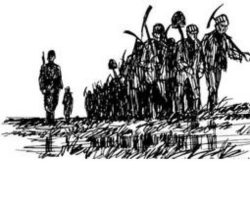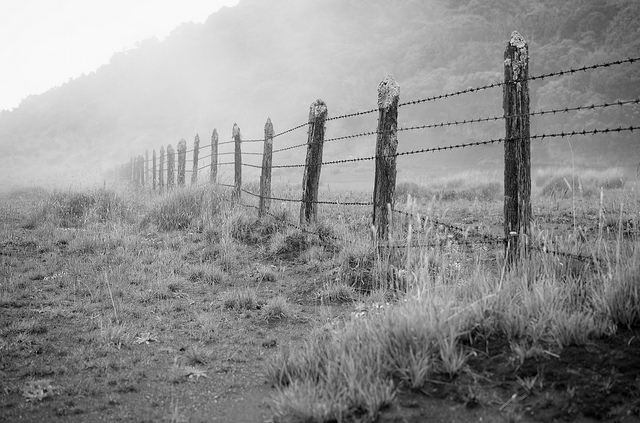I have moved quite a lot in my life, especially in the first part of it, clocking one to three schools per year on average and as many caravans, mobile homes, flats or apartments until the age of 16. The good thing with this nomadic lifestyle is that it has forced me to be quite ruthless over the years in terms of keeping or discarding belongings.
We are now in the process of converting our attic into an adult bedroom in our family home with a view to get me a small desk for my musings and a walking wardrobe for my other half. This not a move but it almost feels like one. To do that I have to get rid of quite a lot of bits and pieces that have been accumulated since our previous move 10 years ago or so.
A lot of stuff has already found its way to charity shops, more junk have landed on a rubbish skip while the rest has to be triaged for storing. Its been a pretty heavy duty process I must say but it has come with some blessings too. Old photos have resurfaced, toddler toys and kids clothes have re-emerged from hidden boxes reminding us how small our not so little guys once were. To be honest the whole experience has provided a few welcomed rides back to memory lane.
As far as I am concerned there aren’t too many things that I have kept from my early childhood or teenage years even. That said I was glad to see an old and cherished French version of an Aristocrats Disney book being if not pristine still intact and in good reading condition. I was also very happy to go thru a few old schools books and show my beautiful stamps collection to my kids.
I was also taken aback at times, for example I unexpectedly bumped into an old book belonging to my mum and with that what a surprise to discover four small notepads full of (bad) urban poetry that I had written in the 90’s. In the book itself, a manuscript called ”Qu’elle etait verte my vallee” (How Green Was My Valley) by Richard Llewellyn, not that this is really significant, the important bit is that there was a small sheet with a hand written version of the Chant Des Marais inserted in it as a book mark. Almost straight away, as soon as I read the first verse the melody found its way back thru my brain at the speed of a boomerang .
The song was composed in the concentration camp of Börgermoormis in Lower Saxony. Originally set up in 1933 by the Nazis, the camp primary function was to home political opponents of the time. Situated in a very hostile environment the prisoners held in Börgermoormis were used as cheap labour and performed various heavy duties around the concentration camp. The site was initially managed by the S.A but when the latter were dismissed the S.S took over.
The guards were ruthless and the conditions in the camp were barbaric, adding insult to injury the captives were expected to sing when going to work. Jumping at the opportunity to produce a passive resistance manifesto, a prisoner named Johann Esser wrote poignant lyrics that were supplemented by a music written by another political inmate called Rudi Goguel. The original title was « Moorsoldatenlied » which can be translated as the song of ”The peat bog soldiers”, it is also known as ”the song of the deported”.
Lettre a un Inconnu (Scroll down for English Version)
Mes yeux sont loin de moi
Mon regard est souvent perdu
Parfois je crois meme que je ne m’entends plus
Mon regard est si lourd et sourd de malentendus
Je sais qu’un jour viendra le temps du vecu
Les geoliers si peu necessaire veulent faire de moi un reclus
Moi a leur politique, a leur commissaire j’exprimerais bien plus que mon refus
It took two weeks apparently to create the song from start to finish and it was sang for the first time on the 27th of August 1933 as part of the ‘Circus Konzentrazani.’ According to Goguel, ”sixteen singers, mostly members of the Solinger Worker’s Singing Club, marched into an arena with their prison outfits and their spades on their shoulders.”
They started singing and by the second verse it is said almost all of the 1,000 prisoners were singing along to the refrain. With every verse, the refrain apparently grew stronger and by the final verse even some of the SS sentinels were singing. Unverified records mentioned that the sixteen singers stuck their spades in the sand and marched out of the arena leaving their spades behind.
 The ‘Börgermoorlied’ (Song of Börgermoor), is not the only one but one of the most famous songs to have been created within a concentration camp: it is by far the most well known of all of them.In its English version it became known as the ‘Song of the Peat Bog Soldiers’ and in French it has acquired a symbolic notoriety under the title ‘Le Chant des Marais’. The song was also commonly sung as a Republican anthem throughout the Spanish Civil War, personally the first time I heard it was at a military parade by the French Foreign Legion.
The ‘Börgermoorlied’ (Song of Börgermoor), is not the only one but one of the most famous songs to have been created within a concentration camp: it is by far the most well known of all of them.In its English version it became known as the ‘Song of the Peat Bog Soldiers’ and in French it has acquired a symbolic notoriety under the title ‘Le Chant des Marais’. The song was also commonly sung as a Republican anthem throughout the Spanish Civil War, personally the first time I heard it was at a military parade by the French Foreign Legion.
Never before a song had produced such a tangible and palpable impact on me. It was almost like a modern blues but something that was far more and utterly visceral. Was it the monotonous rhythm or the lyrics evoking despair that struck me, I don’t know. Boosted by a chorus celebrating a state of nothingness I asked myself how come human hearts had the ability to hibernate for so long.
https://www.youtube.com/watch?v=hWlQrGIhSk4&list=RDhWlQrGIhSk4
English Version
Wherever the eye may wander,
All around only moor and heath
No singing of the birds to raise our spirits,
Oak trees stand bleak and crooked.
We are the peat bog soldiers
And travel spade in hand
Into the moor!
Here in this bleak heath
The camp was built,
Far from any joy
We lie hidden away behind barbed wire.
We are the peat bog soldiers…
Work columns leave in the morning
To go into the moor.
We dig while the sun burns down on us
But our thoughts remain with home.
We are the peat bog soldiers…
Homewards, homewards, each of us longs
To our parents, wives, and children.
A sigh opens up many of our chests
Because we are caught here.
We are the peat bog soldiers…
The guards walk back and forth
No one, no one can get through,
Escape will only cost you your life,
The fort is fenced four times around
We are the peat bog soldiers…
But for us there are no complaints
Because it cannot be winter forever.
Someday we will happily say:
Home, you are mine again.
Then the peat bog soldiers
Will no longer travel spade in hand
Into the moor!
Written Material Copyright 2018 – Pascal Derrien
- Attics, Old Photos and a Concentration Camp Song – by Pascal Derrien - February 9, 2018

